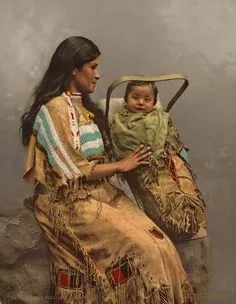Apr 4, 2016
Traditionally, how did Native American's name their children?
An elder is often asked to choose a name for a person (child or adult). The name is revealed to them in many ways, dreams/visions, personality/characteristics of the person, or the name of the persons past family member, etc.
In the past, names that were given to a baby, were not used too early to address the child since the baby had just come from the spirit world. It was felt that if their name was too well known they might be called back.
So people had many names or nicknames throughout their life. This still holds true in many places, people will have an English/government name, a spirit/Native name, but are commonly known by their nicknames.
Many Anishinabe children have more than one personal name given at different times. Children may receive one or more names when they are small. The name may be given by an elder. Parents customarily bring tobacco to the elder who they want to name their child. The name comes to the elder in a dream. The parents then prepare a ceremonial feast. After receiving a name, the child and elder are bonded in a special relationship. They call each other, "nii–ya–wé e" meaning "my namesake". A child may be given a nickname rendered either in Ojibwe or English. This name reveals something about the child´s special character. Examples of naming occasions:
Birth name
Formal name
Nickname
Name given during illness
Name given at puberty – named after one of personal attributes
A child´s name may be that of an elder who has passed on
Nations hand names down through the clans to which they belong. Children receive their Indian name at mid-winter ceremony. Only one person can have that name at a time. When the person dies, the name is given back to the clan to be given to another child at some future time. Native names are never in English
Many tribes named their children based on events that occurred or perhaps animals seen on or near the day of the birth. Also, if a parent had a vision that they felt was a sign for the child, they would get the name from the events they witnessed in their vision.
An example from the Anishinaabe (Ojibwa/Chippewa)tradition: "My name is Zhaawaabanokwe. Translated it can be said "Southern Morning Woman" or "Woman of the Southern Morning"
If it did not have "kwe" at the end, which means woman, It would be a man's name, "Southern Morning"
In early contact, English often used "maiden" which then was corrupted into "princess"
That is how names such as "Princess Morning Star" came about. The name more likely was, "Morning Star Woman".
Image provided by: Poarch Creek mother & Child - commons.wikimedia.org
Share this article with friends!
Tags:
#native#american#,#traditions,#elder,#tribes,#maiden,#chippewa,#princess#morning#star,#starzpsychics.com,#mediums

